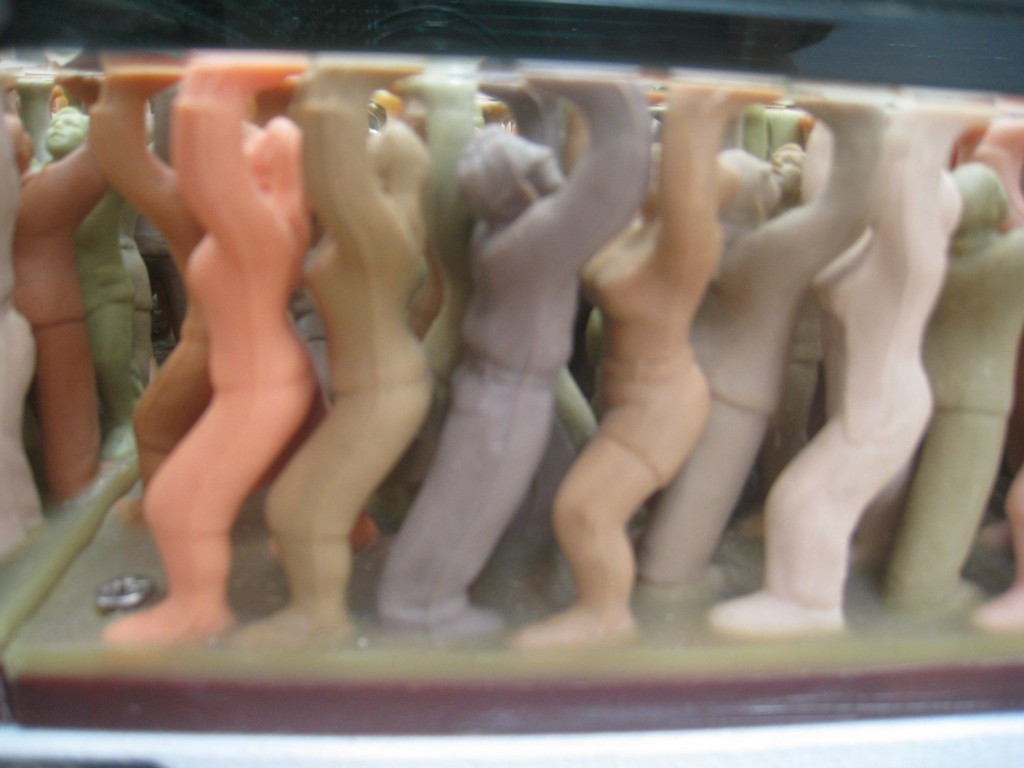As it is in most cities, local galleries time their exhibits to coincide with the frenzy of art fair week. In Singapore for Art Stage, I had time enough to catch three.
Tag Archives: valentine willie fine art
Power Tripping with Don Salubayba and Jonathan Ching
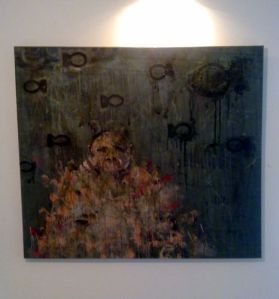
Don Salubayba, "Fast Food Nations"
Two shows this week, one in Manila, the other in Kuala Lumpur, both by Filipino visual artists, explore the concept of power. Don Salubayba examines how we wield it in our everyday lives. Jonathan Ching observes the effects of power that has diminished over time.
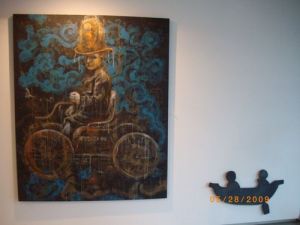
Don Salubayba, "The Epitome of Pogi Points"
THE UNOFFICIAL THEORY OF POWER, DON SULABAYBA
I first encountered Don Sulabayba’s art in in 2004. He transformed one gallery in the third floor of the CCP into Spoonful Discard, an installation of plastic spoons and used pre-paid cellphone cards. I found his materials a bit rough, but even then, thought him an artist that
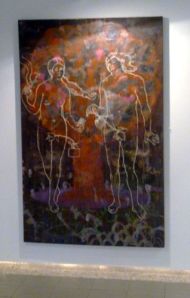
Don Salubayba, "The Great Delude"
should bear watching. How gratifying to see a more mature body of work in this show, paintings that still bear his signature drips, predominantly faceless subjects, and floating layers of objects, but rendered in richer, deeper hues.
People who only see Don as a visual artist working with paintings overlook his contributions to his other passions, performance art via Anino Shadowplay
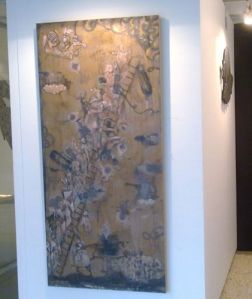
Don Salubayba, "A Scheme of Order"
and his social involvement with TutoK. His multi-faceted interests exert obvious influence in his works on canvas. You will always get some commentary on political or religious issues. But never too heavy, always nimbly handled, usually with a touch of humor. Here he muses on the control held over us by material and non-material substances, the power that innocuous objects have on our daily routines.
The Epitome of Pogi Points comments on how Henry Ford’s Model T, the first vehicle marketed under a brand name, has been transformed from a necessary means of transportation into an object to showcase one’s social standing or even as a chick magnet. The car then becomes a tool of power: the flashier the car, the more goodlooking or socially-acceptable its owner.
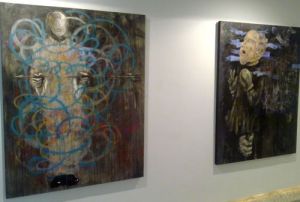
Don Salubayba, "The Art of Misdirection" and "The Manipulation of an Inanimate Object"
The haunting Fast Food Nations illustrates Don’s thought process on the bombing of Nagasaki, the first time man used an atomic bomb to show power over another race. How ironic that the Americans used a bomb nicknamed Fat Man to subdue the Japanese sixty years ago, when today, we know that many Americans suffer from obesity brought about by their penchant for the calorific fried delights of their fast food chains. As these fast food chains have proliferated all over the world, Fat Man brings destruction of a different sort, killing through heart disease and other health concerns.
The story of Adam and Eve as narrated in the Book of Genesis is the subject of The Great Delude. Here Don tackles the power of a story from the bible which, from constant telling and retelling, we have forgotten has no basis in fact. It remains a myth. Scheme of Order likewise takes on the effect of religious beliefs. Don portrays a ladder of indulgences, an image found in medieval art, to illustrate the control of the Catholic Church. We believe ourselves forgiven from sin if the church so grants this forgiveness,
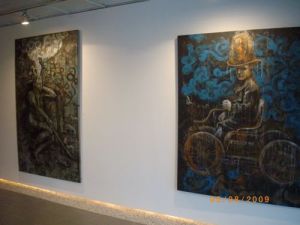
Don Salubayba, "The Death of Imagination" and "The Epitome of Pogi Points"
even if in the past, the influential purchased clemencies as they saw fit.
Don departs for Sydney this week on a residency grant for his involvement with shadow plays. As always, we wish him luck as we look forward with anticipation to the work he will produce when he returns.
The Theory of Power by Don Salubayba is on view from 30 May to 20 June 2009 at The Drawing Room, 1007 Metropolitan Ave, Metrostar Bldg, Makati City. Ph (632)897-7877 or visit www.drawingroomgallery.com
DAYS OF THUNDER, JONATHAN CHING
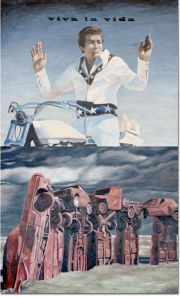
Jonathan Ching, "Days of Thunder"
In his first solo exhibit outside Manila, Jonathan Ching paints images of larger-than-life personalities who have to face the waning of their influence and confront their own mortality. He does this through a series of large scale canvases, each one pairing a legendary notable with a portent of his doom. We see former dictator Ferdinand Marcos asking for more life as he sees his legacy and hold over a society crumble. His famous gigantic cement bust falls to ruin due to the ravages of time and the disgust of a populace he once held absolute sway over. In the exhibit’s title piece, Days of Thunder, Jon paints Evel Kneivel, paunchy and middle-aged, still attempting to sail over a mountain of used cars, unable to
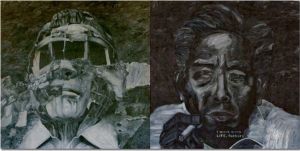
Jonathan Ching, "Maybe Immortality is Just a Matter of Remembrance"
let go of his celebrity. Another large canvas depicts a proud matador and a bull, each one the nemesis of the other, fates intertwined. One’s loss is the other’s gain, no one will triumph without undoing the other.
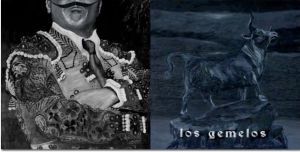
Jonathan Ching, "Though Paradise May Be Merry and Bright"
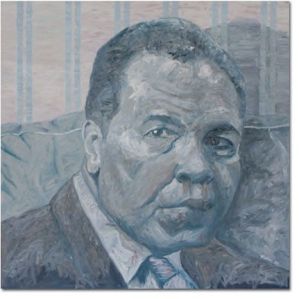
Jon Ching, "We Were Immortals (I am the Greatest)"
He dubs his smaller canvases his We Were Immortals series. He paints Muhammed Ali, once the greatest, now wasting away with a crippling condition. Jon portrays the Lone Ranger as an aging superhero reliving his glory
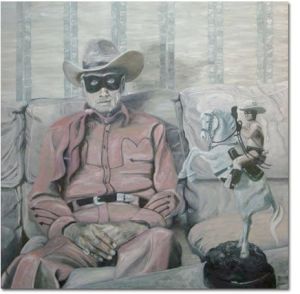
Jonathan Ching, "We Were Immortals( I Was Always the Action Hero)"
days. Yul Brynner looks out from a tv screen, speaking against the effects of smoking in an infomercial released posthumously. And closer to home, Jonathan depicts his father as a younger man, at the age when to his son he seemed invincible.
In a bit of a departure from the rest, he does a portrait of himself asleep, dreaming of a childhood when he had no fears to limit him.
“Look at them now” may very well have been the catchphrase he used to jumpstart his discourse on power and immortality. If he asks that of himself, well, what would he see? A Civil Engineering
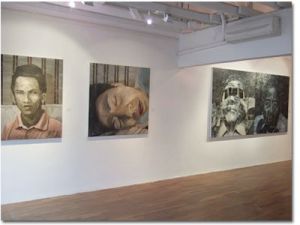
View of "We Were Immortals" series depicting Jonathan's dad as a younger man and of himself asleep
graduate who pursued his dream of becoming an artist, and look at him now.
Days of Thunder by Jonathing Ching is on view from 30 May to 13 June at Valentine Willie Fine Arts in Kuala Lumpur. Visit www.vwfa.net
or www.jonching.com
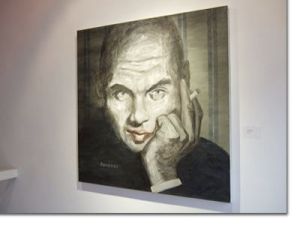
Jonathan Ching, "We Were Immortals (I Was Magnificent)"

